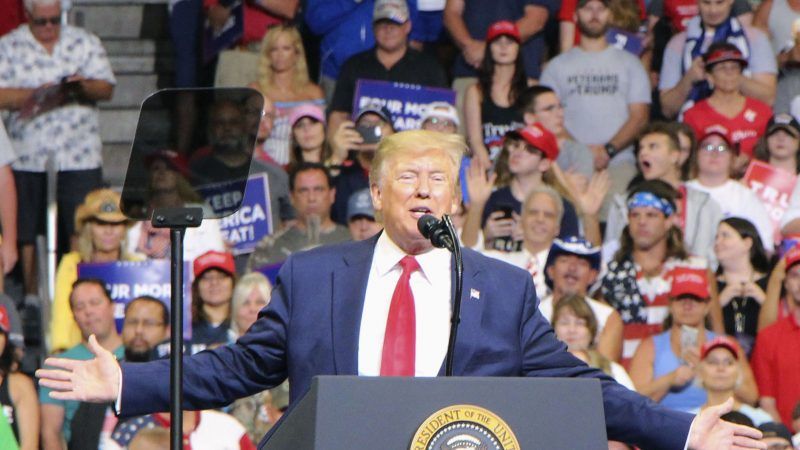Trump's 2020 Campaign Kickoff Was a Nostalgic Throwback to…2016
The president's first big rally was a greatest hits show that dodged many of today's biggest issues.

The sleeper issue in the 2020 election will be…the 2016 election. Or at least that's what Trump seems to think.
The president kicked off his 2020 campaign last night with a large rally in Orlando, Florida, that felt a lot like a campaign rally from three years ago. Trump is a little more polished now, a little more conventional: His early rallies would often feature a long, unscripted passage in which he just riffed on the news, or read "The Snake," a poem about taking in a serpent that eventually bites its host, because, well, it's a snake. And although there were small Trumpian riffs and departures here and there, the speech felt relatively normal, at least so far as a speech by Donald Trump, president of the United States of America, can ever feel normal.
But the list of topics, and the president's treatment of them, has barely changed since his last campaign: He's still railing about the dangers of immigrant crime and sanctuary cities, still attacking trade deals he says have been bad for American workers, still lambasting "career politicians" and "Washington insiders," still complaining about Crooked Hillary and her emails. For a moment, parts of the crowd chanted "lock her up." Foreign trading partners, immigrants, Hillary Clinton—in a Trump speech, these are the ever-present enemies, and Trump's focus is on rhetorically taking them down.
Yes, Trump has added a handful of applause lines about the dangers of socialism, and how Republicans "believe in freedom," which is well and good, at least as far as it goes. As it turns out, however, it doesn't go very far.
It's more than a little bit odd to hear Trump rail against socialism before, as he did last night, moving to his support for the country's biggest entitlement programs—Medicare and Social Security. "We will defend Medicare and Social Security for our great seniors," Trump said, repeating a promise he made during his previous campaign. "We will defend it like nobody else." Trump is deeply opposed to socialism—except for the socialism we already have.
But promises to defend Medicare and Social Security have been part of Trump's shtick, and have been since he launched his campaign. Those promises aren't going away now. They're part of his greatest hits collection, and Trump's campaign launch suggests he is determined to play all the hits, over and over again.
Trump's most ardent supporters will probably appreciate that approach; the crowd last night certainly appeared to be enthusiastically on board. But it's a narrow appeal to those who already like Trump rather than an attempt to broaden his coalition.
And there's something rather strange about this strategy coming from a sitting president, who, despite his enormous influence on national affairs, appears to be living in the past. By returning to 2016 in the race for 2020, Trump is preparing to run a campaign premised on his own irrelevancy.
The economy is humming, for the moment, but Trump's trade war is threatening economic stagnation, and the steel workers he promised to protect are losing their jobs as manufacturers shutter their facilities. Trump's policies have sparked chaos and confusion at the border, and have resulted in a Democratic electorate that is more pro-immigration than ever. There's a simmering conflict with Iran, stoked in large part by Trump's inner circle. The budget is a slow-moving disaster, heading rapidly toward permanent trillion-dollar deficits. Even Trump's precious old-age entitlements are growing creaky, with insolvency now just years away. Yet he had nothing to say about their fiscal decline.
Trump's greatest-hits theory of the 2020 campaign is fundamentally an appeal to nostalgia —specifically, nostalgia for three years ago, when Trump wasn't yet president and wasn't responsible for acting like one. But nostalgia, enjoyable as it might be, doesn't address the actual problems of today. It's a way of avoiding the present and its particular challenges which, in this case, means those created by Trump's own presidency.

Show Comments (30)